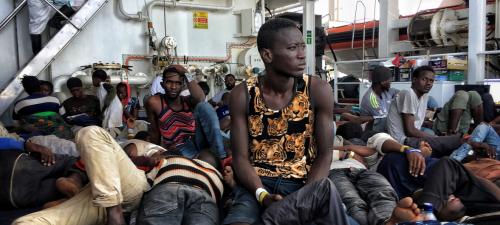Despite drop in numbers, desperate migrants to Europe face greater perils, UN refugee agency reports
While the number of migrants and refugees reaching Europe declined last year, the dangers they faced along the journey in many cases increased, according to a new report from the United Nations refugee agency.

Refugees on board an Italian Coast Guard ship, which rescued them after their boat capsized off the coast of Libya. Migrants and refugees undertake a perilous sea crossing aboard rickety boats with hopes of reaching Europe, unfortunately many lose their lives along the way.
The number of people crossing the Mediterranean Sea to reach Italy from Libya, for example, decreased by 74 per cent in the first three months of 2018 compared to the same period last year. But the share of these migrants perishing along the way more than doubled, according to the report, Desperate Journeys.
Between January and March, one person died for every 14 persons successfully crossing the sea, compared to one death for every 29 arrivals in the first three months of 2017.
Furthermore, those reaching Europe in recent months arrived in extremely poor health and a significant share of them experienced trafficking, torture, sexual violence and other abuses prior to boarding boats in Libya, said the report, issued Wednesday by the Office of the UN High Commissioner for Refugees (UNHCR).
Those attempting that sea journey also risk drowning aboard unstable boats, which often cram in people many times their capacity.
“Journeys to and through Europe for refugees and migrants remain fraught with danger,” said Pascale Moreau, director of the refugee agency’s Europe Bureau, as he introduced the report.
He underscored the importance of swift and fair asylum procedures for those seeking international protection.
“Managing borders and offering protection to refugees in line with States’ international obligations are not mutually exclusive nor incompatible,” Mr. Moreau said.
Many of the migrants and refugees hoping to reach Europe are seeking refuge from violence and deepening economic insecurity in their home countries, in Africa, Asia and the Middle East.
While overall numbers reaching Europe were down in 2017 compared to 2016, the flow of desperate migrants to Spain climbed, and the number reaching Greece surged in the latter months of last year.
“Asylum-seekers arriving by sea to Greece faced extended stays in overcrowded and dire conditions on Greek islands,” the report said.
For many, journey ends without setting foot on European soil
“When we reached Libya, the driver told us we had to pay another 1,500 dinars ($1,100) per person, so 4,500 dinars for all three,” reads the testimony of 26-year-old Daniel, who left Cameroon in 2017 along with his brother and uncle hoping to reach Europe.
“We didn’t have any more money.”
Unable to pay the asking price, the three were tortured and held captive by traffickers in Libya, he said, before they were taken to Niger where he was bound into forced labour by his captors, while his family remained hostage.
There have been reports of human traffickers demanding as much as $10,000 from individuals for transportation to Europe.
Elsewhere on the continent, increased restrictions and “push backs” facing people on the move have compelled them to take alternative and often dangerous routes to move across Europe, according to the new report. As Hungary tightened its borders, for example, more migrants are crossing from Serbia to Romania while others move from Greece through Albania, Montenegro and Bosnia-Herzegovina to Croatia.
High risks for women and unaccompanied children
Women, especially those travelling on their own, and unaccompanied children remain particularly exposed to risks of sexual and gender-based violence along the routes as well as in some locations within Europe, the report said.
Once children arrive in European countries, lengthy waiting periods
for asylum applications, slow family reunification processes and limited access to relocation mechanisms compound the challenges, it said.
Increased solidarity and responsibility-sharing needed
Addressing the desperate situation requires wider international support for States at primary arrival points in Europe, such as arrangement of safe relocations. The European Union, it suggested, should strengthen cooperation among countries within the region.
The refugee agency also called for enhanced access to safe and legal pathways for those in need of international protection, including greater commitments to resettlement, removal of obstacles to family reunification and strengthened protection for children.
Source:United Nations
- 192 reads
Human Rights
Ringing FOWPAL’s Peace Bell for the World:Nobel Peace Prize Laureates’ Visions and Actions

Protecting the World’s Cultural Diversity for a Sustainable Future

The Peace Bell Resonates at the 27th Eurasian Economic Summit

Declaration of World Day of the Power of Hope Endorsed by People in 158 Nations

Puppet Show I International Friendship Day 2020

